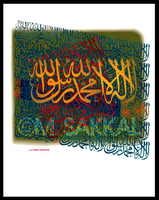If you do charity, your house will always be rich.'
By Sharida Mohamedjoesoef, Ramadan Roundup III for the Amsterdam Weekly
True, I could have easily opted for a Turkish or Moroccan Ramadan event and, by God, there are plenty of those at the moment. Yet, this time, thrill-seeking me decided to head for Pakistan Day, if only to make it clear that birds of a Muslim feather do not necessarily flock together. Mind you, before I set out, I meticulously examined the programme and its organisers to make sure that your unveiled Ramadan reporter would not be kicked unceremoniously out by some lost Taliban sympathiser before she could say 'as-Salaam Aleikoum'. But it all turned out very Sharia--oops, Sharida-proof. Phew. Sigh of relief. The event was organised by Sabra Bano, a Pakistani feminist who has lived in the Netherlands for 20 years, and now heads the Dutch chapter of Gender Concerns International. That name may not ring a bell, but if I told you that the Egyptian branch includes none other than prominent writer Nawal al Saadawi... Exactly. I rest my case.
'The reason for organising this Pakistan Day is twofold,' Bano says. 'Our primary aim is to commemorate the horrific earthquake that hit Pakistan on 8 October last year, leaving eighty thousand people dead and over three-and-a-half million homeless. This being organised by Gender Concerns International, it goes without saying that we also wish to raise awareness and funds to help relieve the plight of Pakistani women in particular.'
Bano's timing is impeccable--what better moment to organise such an event than in the holy month of Ramadan, a month which in essence is about charity, about caring for those who are less well-off. And with half a million Pakistanis still homeless, I'd say they definitely qualify as being in dire need.
As the day got underway, the big hall of the KIT Tropentheater gradually filled with what must have been hundreds of people, a large number of who were young Pakistani boys and girls blessed with dashing good looks. And not a burka in sight. (How else would I have known about the looks?).
Some had come for the debate on gender issues, which turned out a bit of a non-event according to Mohammad Amer: 'This was not a proper debate at all and there was no room for tricky questions, for instance about the role religious Muslim zealots played in denying female aid workers entry in the disaster-stricken areas.'
Most, however, had come to see Sheema Kermani and Khamisu Khan, two living legends in Pakistan, and Kermani not just for her classical dance, either--in her home country she is well-known for her outspoken feminist views.
Just before Iftar, the traditional breaking of the fast, we were treated to a virtuoso performance from alghoza player Khamisu Khan who was accompanied by a single tabla player. An alghoza is an instrument made up of two flutes of equal length joined together. One Pakistani man dressed in a smart business suit clambered on to the stage and danced around like a whirling dervish, going faster and faster, in sync with the applauding audience.
This was definitely a most enjoyable Ramadan gathering, showing a different side of Pakistan, with its informal character, spontaneity, and Bollywood-style music filling the marble hall. People queued to generously ladle steaming traditional food onto their plates. Let's hope that they were equally generous when putting money in the collection boxes...
 Mijn zoektocht in Libanon
Mijn zoektocht in Libanon





